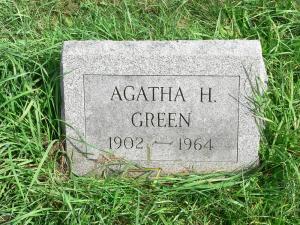 When my parents moved downstairs at 5 Gaines Street, Binghamton, NY, my paternal grandparents, McKinley and Agatha (nee Walker) Green moved upstairs. Her name, BTW, was pronounced a-GATH-a, not AG-a-tha. Yes, it is I who she is holding.
When my parents moved downstairs at 5 Gaines Street, Binghamton, NY, my paternal grandparents, McKinley and Agatha (nee Walker) Green moved upstairs. Her name, BTW, was pronounced a-GATH-a, not AG-a-tha. Yes, it is I who she is holding.
Grandma Green was almost certainly my first Sunday school teacher at Trinity A.M.E. Zion Church, only a couple of short blocks from our home. She had a certain refinement and bearing. While my maternal grandmother would nag me, this grandma gave me the parameters she expected, and I pretty much did it.
It’s rather like some Bill Cosby routine. Grandma Williams was Cos’ mom, “Go to bed, because it’s important for…blah, blah.” Grandma Green was like Cos’ dad: “Go to bed.” OK, grandma.
Of course, I visited her and Pop (my grandfather) virtually every day. One time when I was three, I fell down the flight of stairs from their dwelling to mine. To this day, the hair will grow on an area of chin, just below my lower lip. (Also odd: two of my co-workers fell down flights of steps when THEY were three.)
She was the eldest child of some half dozen kids, and I recall when her father died; I was around 7, so it would have been about 1960. He was this little tyrant, even at his advanced age, and all of his kids were afraid of him, though he was nice to my father and to me.
Red threes
Her greatest contribution to my development was that, when I was six or seven, she taught me how to play the card game Canasta. It’s an arcane game, but I learned to love it. I then taught my great aunt, my mother’s Aunt Deana, how to play. I’ve been playing cards ever since, though the last time I played canasta was against my high school girlfriend’s father over four decades ago.

Then suddenly, at the age of 62, she died. I no longer know from what, though I assume now it was a heart attack. I remember going to the funeral, and the burial. What I don’t recall is ever going to her gravesite afterward, even though her husband and her son lived in the area.
Floral Park
In fact, I pretty much couldn’t remember precisely WHERE she was buried until my niece came across Paul R. at Find A Grave, who is “retired so I have time to walk through the cemeteries and take pictures. In mid-July 2010 I started a project to record as many memorials for the cemeteries in my county (Broome, NY) with pictures that I could.” He added this record on 10/29/2010. She’s buried in Floral Park Cemetery in Johnson City, the village adjacent to Binghamton, and within walking distance of the house that the family moved to in 1972.
Thanks, Paul R. You’ve cleared up part of a family mystery.
When I went to Binghamton in mid-July, my family went to Section M and found the headstone. It was next to a newly-dug grave of her sister-in-law, Jesse Walker, who had died a few days earlier. The SIL was known as “Earl’s Jesse”; my grandmother had a sister named Jesse Walker, and so their brother Earl’s wife got the odd appellation.





